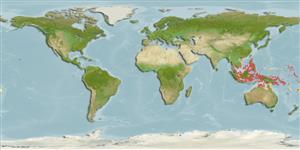Common names from other countries
>
Kurtiformes (Nurseryfishes, cardinalfishes.) >
Apogonidae (Cardinalfishes) > Apogoninae
Etymology: nanus: Name from Latin 'nanus' meaning dwarf, referring to its size being one of the smallest in the genus..
More on authors: Allen, Kuiter & Randall.
Environment: milieu / climate zone / depth range / distribution range
Ecología
marino asociado a arrecife; rango de profundidad 3 - 20 m (Ref. 48635). Tropical
Western Central Pacific: Madang, Papua New Guinea; Maumere, Indonesia; and, near Kota Kinabalu, Sabah, Malaysia.
Tamaño / Peso / Age
Maturity: Lm ? range ? - ? cm
Max length : 6.0 cm SL macho / no sexado; (Ref. 48635)
Short description
Morfología | Morfometría
Espinas dorsales (total): 7; Radios blandos dorsales (total): 9; Espinas anales 2; Radios blandos anales: 8; Vértebra: 24. This species is distinguished by having D VI-I,9; A II,8; pectoral rays 13; lateral line scales 24; predorsal scales 5; gill rakers 7 or 8+20 or 21, excluding an indistinct rudiment on upper limb; preopercular margin serrate; preopercular ridge smooth; body depth 3.4-3.7 in SL; semi-transparent in life with golden-brown midlateral strip, bordered below by narrow silver stripe; tip of lower jaw blackish (Ref. 11893).
Occurs in silty inshore reefs; aggregations observed hovering during the day around both soft and hard coral formations. An oral brooding male collected at Madang, papua New Guinea, contained 328 eggs, which is a relatively low number for the genus (Ref. 11893).
Life cycle and mating behavior
Madurez | Reproducción | Puesta | Huevos | Fecundidad | Larva
Mouthbrooders (Ref. 240). Distinct pairing during courtship and spawning (Ref. 205).
Allen, G.R., R.H. Kuiter and J.E. Randall, 1994. Descriptions of five new species of cardinalfishes (Apogonidae: Apogon) from Maumere Bay, Flores, Indonesia and surrounding regions. Rev. Fr. Aquariol. 21(1-2):27-38. (Ref. 11893)
IUCN Red List Status (Ref. 130435)
CITES (Ref. 128078)
Not Evaluated
Threat to humans
Harmless
Human uses
Más información
Age/SizeCrecimientoLength-weightLength-lengthLength-frequenciesMorfometríaMorfologíaLarvaDinámica larvariaReclutamientoAbundancia
ReferenciasAcuiculturaPerfil de acuiculturaRazasGenéticaElectrophoresesheritabilidadEnfermedadesProcesamientoMass conversion
ColaboradoresImágenesStamps, Coins Misc.SonidosCiguateraVelocidadTipo de nataciónSuperficie branquialOtolitosCerebrosVisión
Herramientas
Special reports
Download XML
Fuentes de Internet
Estimates based on models
Preferred temperature (Ref.
115969): 28 - 29.2, mean 28.8 (based on 1005 cells).
Phylogenetic diversity index (Ref.
82804): PD
50 = 0.5000 [Uniqueness, from 0.5 = low to 2.0 = high].
Bayesian length-weight: a=0.00501 (0.00201 - 0.01253), b=3.26 (3.04 - 3.48), in cm Total Length, based on LWR estimates for this (Sub)family-body shape (Ref.
93245).
Nivel trófico (Ref.
69278): 3.4 ±0.4 se; based on size and trophs of closest relatives
Resiliencia (Ref.
120179): Alto, población duplicada en un tiempo mínimo inferior a 15 meses (Preliminary K or Fecundity.).
Fishing Vulnerability (Ref.
59153): Low vulnerability (10 of 100).
